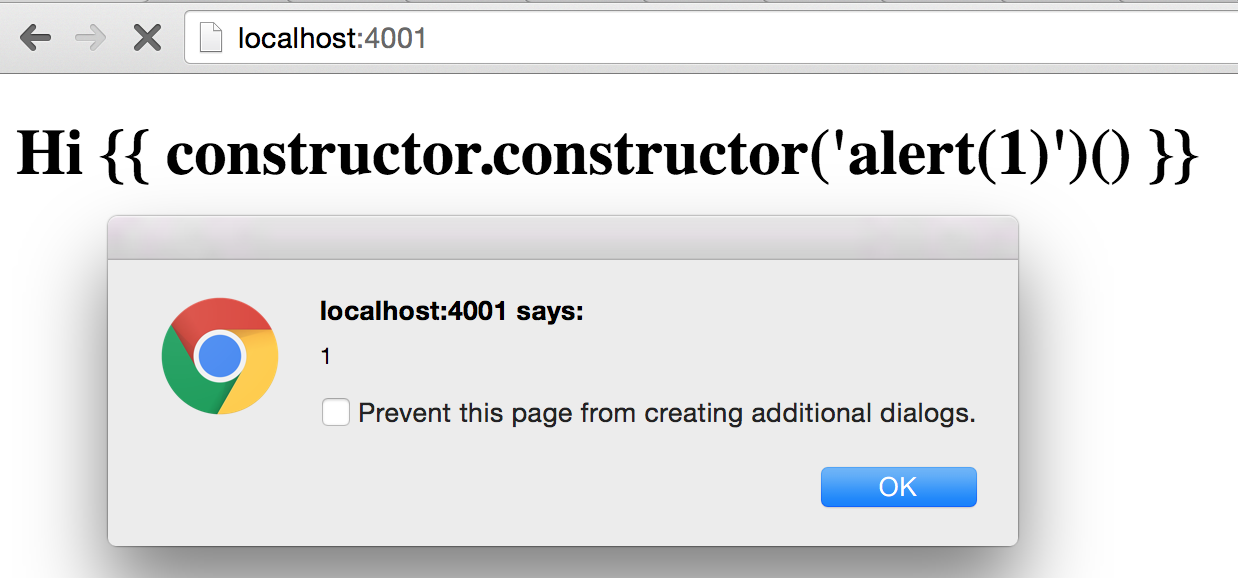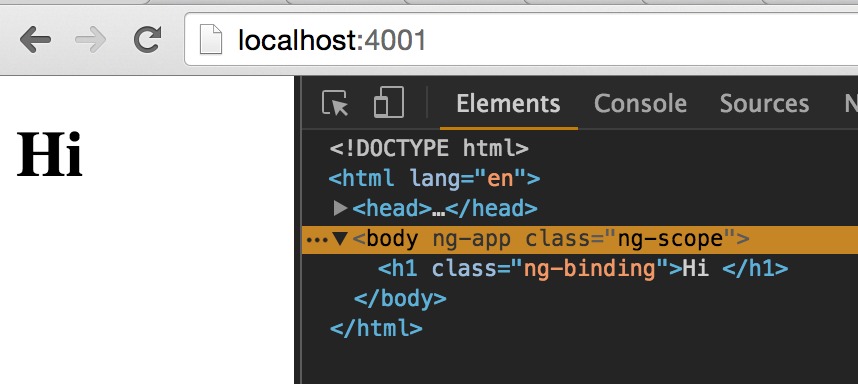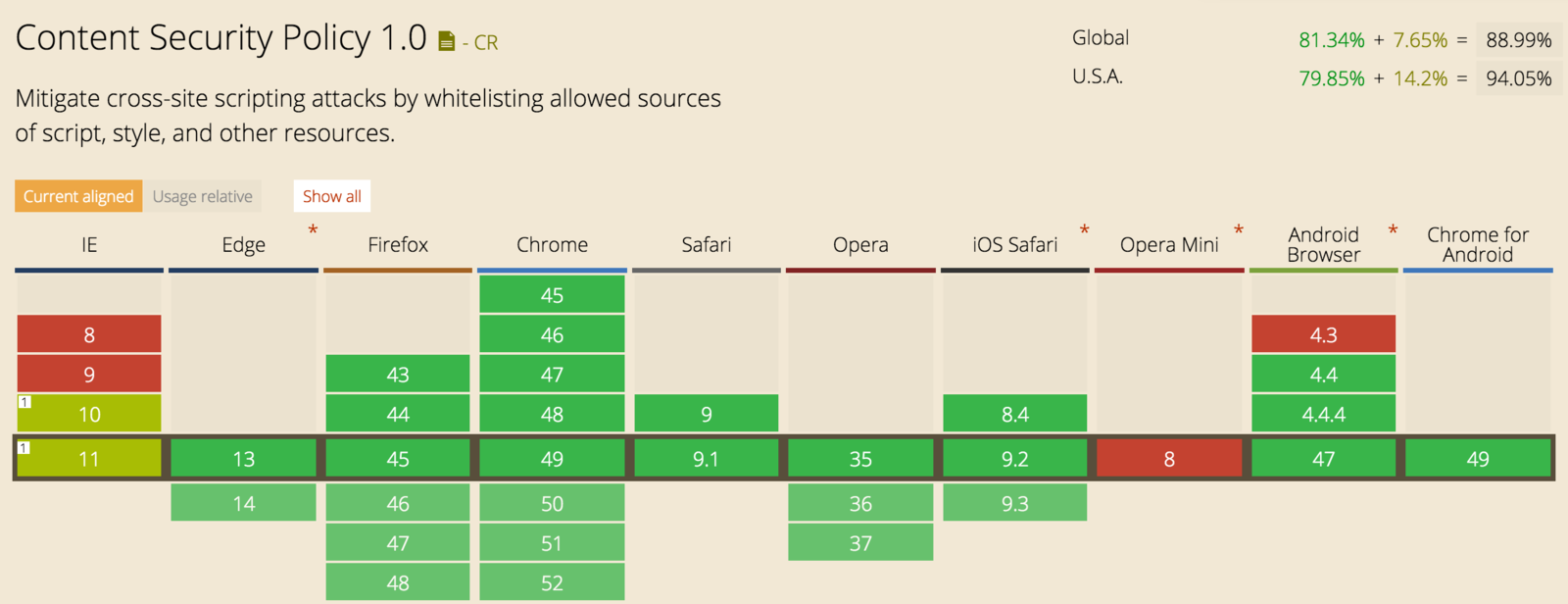
Securing the front end
from a Node server
Gleb Bahmutov
#boscc




You can have your
website hacked but only once.
What if a tree's password is stolen in the forest and no one hears it?
Inspiration
curl -I https://github.com/GitHub headers
$ curl -I https://github.com/
HTTP/1.1 200 OK
Server: GitHub.com
Date: Thu, 21 Jan 2016 00:23:13 GMT
Content-Type: text/html; charset=utf-8
Status: 200 OK
Cache-Control: no-cache
Vary: X-PJAX
X-UA-Compatible: IE=Edge,chrome=1
Set-Cookie: logged_in=no; domain=.github.com; path=/; expires=Mon, 21 Jan 2036 00:23:13 -0000; secure; HttpOnly
X-Request-Id: 49ac67736ceec9bf127572e7c42c8235
X-Runtime: 0.007182
Content-Security-Policy: default-src *; base-uri 'self';
connect-src 'self' live.github.com wss://live.github.com uploads.github.com status.github.com
api.github.com www.google-analytics.com api.braintreegateway.com client-analytics.braintreegateway.com
github-cloud.s3.amazonaws.com; font-src assets-cdn.github.com; form-action 'self' github.com
gist.github.com; frame-src 'self' render.githubusercontent.com gist.github.com checkout.paypal.com;
img-src 'self' data: assets-cdn.github.com identicons.github.com www.google-analytics.com
checkout.paypal.com collector.githubapp.com *.githubusercontent.com *.gravatar.com *.wp.com;
media-src 'none'; object-src assets-cdn.github.com; script-src assets-cdn.github.com;
style-src 'self' 'unsafe-inline' 'unsafe-eval' assets-cdn.github.com
Strict-Transport-Security: max-age=31536000; includeSubdomains; preload
Public-Key-Pins: max-age=300; pin-sha256="WoiWRyIOVNa9ihaBciRSC7XHjliYS9VwUGOIud4PB18="; pin-sha256="JbQbUG5JMJUoI6brnx0x3vZF6jilxsapbXGVfjhN8Fg="; includeSubDomains
X-Content-Type-Options: nosniff
X-Frame-Options: deny
X-XSS-Protection: 1; mode=block
Vary: Accept-Encoding
X-Served-By: d0e230454cb69aa01d4f86fc3a57b17f
X-GitHub-Request-Id: AC552DBA:3AD3:FB489A:56A024F1Content-Security-Policy
Content-Security-Policy:
default-src *;
script-src assets-cdn.github.com;
object-src assets-cdn.github.com;
style-src 'self' 'unsafe-inline' 'unsafe-eval' assets-cdn.github.com;
img-src 'self'
data: assets-cdn.github.com www.google-analytics.com ...;
media-src 'none';
frame-src 'self'
render.githubusercontent.com gist.github.com www.youtube.com ...;
font-src assets-cdn.github.com;
connect-src 'self' live.github.com ...;
base-uri 'self';
form-action 'self' github.com gist.github.comWhy?
Name:
John Doe
<span>{{ name }}<span>
<span>John Doe<span>
Name:
<script>alert('hi')</script>
<span>{{ name }}<span>
<span><script>alert('hi')</script><span>
innerText or innerHTML?
innerText or innerHTML?
Direct text or escaped? ">" or ">"
innerText or innerHTML?
Dangerous, but has styling, elements, etc
Really dangerous if one user's content
can be viewed by another user
InnerHTML example
Will a script embedded in the user-entered content be executed (for another user)?
NEVER EVER EVER?
My Site
My content
User comments
Ads, etc
<script>stealStuff()</script>
Not to us!
source: www.brit.co/latte-art/
How bad things happen to good people
// server
const app = koa()
app.use(function * () {
this.render('index.jade', {
greeting: 'Hello world'
})
})// Jade template
doctype html
html(lang="en")
head
title Example
body
h1 #{greeting}<body>
<h1>Hello world</h1>
</body>// server
const app = koa()
app.use(function * () {
this.render('index.jade', {
greeting: '<script>alert("1");</script>'
})
})// Jade template
doctype html
html(lang="en")
head
title Example
body
h1 #{greeting}Jade variables are HTML escaped by default
<body> <h1><script>alert("1");</script></h1> </body>
// server
const app = koa()
app.use(function * () {
this.render('index.jade', {
greeting: '{{ a + b }}'
})
})// Jade template
doctype html
html(lang="en")
head
title Example
body
h1 #{greeting}<body>
<h1>{{ a + b }}</h1>
</body>
// server
const app = koa()
app.use(function * () {
this.render('index.jade', {
greeting: '{{ a + b }}'
})
})// Jade template
doctype html
html(lang="en")
head
script(src="https://code.angularjs.org/1.0.1/angular-1.0.1.js")
title Example
body(ng-app)
h1 #{greeting}Angular template
<body ng-app="" class="ng-scope"> <h1 class="ng-binding">0</h1> </body>
"AngularJS better not execute {{ <script>...</script> }} tags or I will loose it!"
AngularJS does NOT execute {{ <script>...</script> }} tags
// server
const app = koa()
app.use(function * () {
this.render('index.jade', {
greeting: 'Hi {{constructor.constructor(\'alert(1)\')()}}'
})
})// Jade template
doctype html
html(lang="en")
head
script(src="https://code.angularjs.org/1.0.1/angular-1.0.1.js")
title Example
body(ng-app)
h1 #{greeting}

Template is NOT in DOM

Runs on every digest cycle
Will never happen to me
Angular 1.x edition
{{constructor.constructor('alert(1)')()}}
fixed in Angular 1.2
Will never happen to me
{{ (_=''.sub).call.call({}[$='constructor'].getOwnPropertyDescriptor ( _.__proto__,$).value,0,'alert(1)')() }}
Will never happen to me
{{ objectPrototype = ({})[['__proto__']]; objectPrototype[['__defineSetter__']]('$parent', $root.$$postDigest); $root.$$listenerCount[['constructor']] = 0; $root.$$listeners = [].map; $root.$$listeners.indexOf = [].map.bind; functionPrototype = [].map[['__proto__']]; functionToString = functionPrototype.toString; functionPrototype.push = ({}).valueOf; functionPrototype.indexOf = [].map.bind; foo = $root.$on('constructor', null); functionPrototype.toString = $root.$new; foo(); }} {{ functionPrototype.toString = functionToString; functionPrototype.indexOf = null; functionPrototype.push = null; $root.$$listeners = {}; baz ? 0 : $root.$$postDigestQueue[0]('alert(location)')(); baz = true;'' }}
Will never happen to me
{{ 'this is how you write a number properly. also, numbers are basically arrays.'; 0[['__proto__']].toString = [][['__proto__']].pop; 0[['__proto__']][0] = 'alert("TROLOLOLn"+document.location)'; 0[['__proto__']].length = 1; 'did you know that angularjs eval parses, then re-stringifies numbers? :)'; $root.$eval("x=0", $root); }}
Still in ng 1.4.5
Lesson: you cannot sanitize your way out of <script> tags
Solution: disable inline JavaScript
<body>
<script>function willNotRun() {...}</script>
<script src="assets/js/script.js"></script>
</body>external
inline
Attacker (probably*) cannot change JavaScript on our server
How to disable inline JavaScript: Content-Security-Policy (CSP)
<meta http-equiv="Content-Security-Policy"
content="script-src https://code.jquery.com 'self';">
Wide support for CSP (browsers, web apps)
Examples
// server
const app = koa()
app.use(function * () {
this.render('index.jade', {
greeting: 'Hi {{constructor.constructor(\'alert(1)\')()}}'
})
})// Jade template
doctype html
html(lang="en")
head
meta(http-equiv="Content-Security-Policy",
content="script-src https://code.angularjs.org 'self';")
script(src="https://code.angularjs.org/1.0.1/angular-1.0.1.js")
title Example
body(ng-app)
h1 #{greeting}Back to our example
Added

// server
const app = koa()
app.use(function * () {
this.render('index.jade', {
greeting: 'Hi {{40 + 2}}'
})
})Regular Angular expressions work with CSP
// server
const app = koa()
const helmet = require('koa-helmet')
app.use(helmet.csp({
directives: {
defaultSrc: [],
scriptSrc: ['https://code.angularjs.org'],
styleSrc: [],
imgSrc: [],
objectSrc: [],
sandbox: ['allow-scripts']
}
}))
// $ http localhost:4001
// HTTP/1.1 200 OK
// Content-Security-Policy: default-src; \
// script-src https://code.angularjs.org; \
// style-src; img-src; object-src; sandbox allow-scriptsUse response headers for CSP
CSP info: content-security-policy.com
validation, checking: cspvalidator.org

Server-side templates :(
app.get('/', function (req, reqs) {
res.render('index', {
title: 'Example',
analyticsId: '4xy-0123456'
});
});head
title #{ title }
script.
var analyticsId = '#{ analyticsId }';
script.
// use variable analyticsIdinline
Solution: render external JS
// analytics-config.js
var analyticsId = '4xy-0123456';
head
meta(http-equiv="Content-Security-Policy",
content="script-src 'self';")
title #{ title }
script(src="js/analytics-config.js")
script(src="js/analytics.js")js-to-js middleware
// views/config.js
module.exports = {
analyticsId: 'default-id'
}
// server.js
var app = require('express')()
var jsToJs = require('js-to-js')
app.engine('js', jsToJs)app.get('/js/analytics-config.js', function (req, res) {
res.setHeader('content-type', 'application/javascript');
res.render('config.js', {
analyticsId: '4xx-xxxxx'
});
});actual value
js-to-js middleware
// js/config.js
var analyticsConfig = {
"analyticsId": "4xx-xxxxx"
};User receives
js-to-js also wraps JS scripts (like Google Analytics)
Pass entire config at once
var jsToJs = require('js-to-js');
app.get('/js/config.js',
jsToJs('demoConfig', { foo: 42, bar: 21 }));User receives
// js/config.js
var demoConfig = { foo: 42, bar: 21};With a little help, Express can send ZERO inline JavaScript
It is free!
Can an attacker change our server code?
It is a jungle out there
Simple server example depends on > 100 modules
jade-angular-template-attack@1.0.0
├─┬ koa@1.2.0
│ ├─┬ accepts@1.3.2
│ │ └── negotiator@0.6.0
│ ├── co@4.6.0
│ ├─┬ composition@2.3.0
│ │ └── any-promise@1.1.0
│ ├── content-disposition@0.5.1
│ ├── content-type@1.0.1
│ ├─┬ cookies@0.6.1
...npm list
What if someone unpublished negotiator@0.6.0 and then published malicious code under negotiator@0.6.0?
negotiator@0.6.1?
bad-module@0.1.0
- is loaded by the Node system
- looks through require.cache
- starts spying on any "login" method
- steals stuff
Making "good" modules read-only is difficult
You can restrict APIs via preloader
$ npm i -g toolbag
$ node -r toolbag server.jsDo not let anyone publish under your name
please please please please please please please please please please please please please please please please please please please please please please please please please please please please please please please please please please please please please please please please please please please please please please please please please please please please please please please please please please please please please please please please please please please please please please please please please please please please please please please please please please please please please please please please please please please please please please please please please please please please please please please please please please please please please please please please please please
Kik-gate
- Guy has bunch of NPM modules including "kik" and "left-pad"
- Company Kik asks him to release "kik" name from NPM registry
- Guy refuses
- Kik goes to NPM Registry Co and Co gives "kik" name to Kik
- Guy gets angry and removes ALL his packages from NPM registry
- Bunch of packages depend on "left-pad" and stop working
- Guy #2 grabs released names AND PUBLISHES his code under same names and versions
- NPM Registry Co un-unpublishes original modules
- NPM Registry co changes its "unpublishing policy"
You cannot unpublish after 24 hours
Even unpublishing after 1 second is a RISK
If you push sensitive info to public GitHub or publish to NPM registry - it is out
All major NPM projects has some sensitive information leaked
NPM auth token, GitHub tokens, passwords, SSH keys, etc
Solution = prevention
-
Code and security reviews, checklists
-
ban-sensitive-files NPM module
ban-sensitive-files
- Checks filenames
- Checks .npmrc contents
- Modified (pre-commit) or all files (CI)
- demo at https://asciinema.org/a/33377
Conclusions
Do not be an easy target
Do not be an easy target
Do not be an easy target
Gleb Bahmutov

#boscc